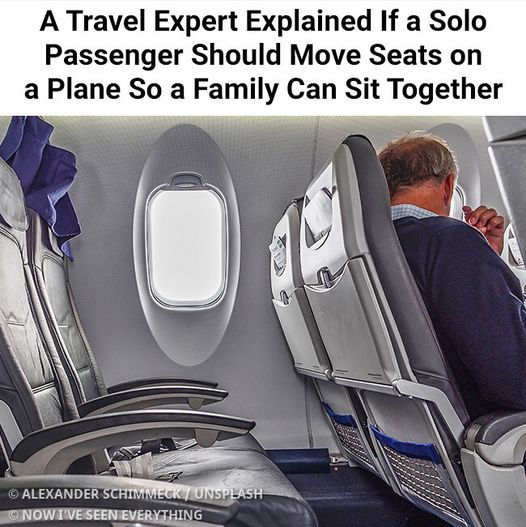A heated debate regarding plane etiquette has gained widespread attention online. Should solo plane passengers be obliged to surrender their assigned seats to accommodate a family seeking to sit together after being seated separately? This contentious issue sparked a lively exchange of opinions in the comments section of an Instagram post by the Today Show.
Sunny Anderson, the renowned host of Food Network’s The Kitchen, also chimed in with her perspective. Stating, “I’m sorry, but I choose the window seat for my anxiety, and I shouldn’t have to justify that or face criticism for it just to accommodate your visible concerns. If I can’t secure a window seat, I genuinely prefer to look for another flight.” Anderson expressed candidly.
The comments expressed a divided viewpoint, with the majority supporting the rights of the solo plane passenger
The controversy stemmed from a viral TikTok video. In which a lone flyer recounted her experience of finding a mother with two children already occupying her assigned window seat when she boarded the plane. The mother promptly requested the solo flyer to switch to a middle seat so that her family could sit together.

So, in such a situation, what would be considered proper etiquette?
PEOPLE sought advice from Nicole Campoy Jackson, a travel expert, advisor, and writer at Fora Travel, to share her tips on how to handle a similar scenario. “In this particular case of the solo plane passenger, I understand why she didn’t want to move. A window seat, especially one pre-booked as such, is very much not the same thing as a middle seat.” Jackson says.
Nicole Campoy Jackson’s advice on handling seating situations aligns with the official practices of most airlines and their regulating bodies. It’s essential for passengers to be aware of and adhere to the airline’s seating policies before making their bookings. This way, they can avoid potential conflicts and discomfort during their travel experience. Understanding the rules and guidelines set by the airline ensures a smoother and more pleasant journey for all passengers involved.
How to prevent an incident similar to this solo plane passenger in the future

According to Nicole Campoy Jackson, passengers should try to select their seats in advance, especially for situations like this. She believes it’s unreasonable to board a plane with the expectation that someone will willingly give up their seat for you.
In general, airlines offer seat selection options during the booking process. Allowing passengers to ensure they are seated together with their group, if possible. However, some airlines may charge an additional fee for the privilege of choosing a specific seat, creating a barrier for certain travelers.
In the summer of 2022, the Department of Transportation issued a new guideline to address this concern. The agency’s Office of Aviation Consumer Protection released a notice “encouraging,” but not mandating, U.S. airlines to adopt policies that facilitate seating children adjacent to accompanying adults whenever feasible and without extra charges.
Who would be responsible for a last-minute seat switch? According to Jackson, the responsibility does not lie with the displaced passenger.
In the event of a seat conflict, it becomes the airline’s and flight attendants’ role to provide customer service and assistance to the family if someone declines to switch seats. In such cases, it is no longer solely the responsibility of the solo plane passenger to resolve the situation. The airline staff should step in to find a suitable solution and ensure that the family can sit together. Doing so without causing inconvenience to other passengers.

Is expecting special treatment fair?
According to Jackson, it’s essential not to board a plane with the expectation that other passengers will accommodate your seating preferences, especially if your desired seat is not as comfortable or better than theirs. Opinions on the subject were varied and brought to the comments section of the Today Show’s post.
However, one comment appeared to strike a middle ground on the issue. The commenter expressed that it is equally acceptable to ask for a seat change as it is to decline such a request. They highlighted the importance of accepting that saying “no” is not offensive and asking for something is not rude. In other words, open communication and mutual respect are vital when dealing with seating arrangements and similar situations.
